Why is WholeFoods STILL using Canola Oil? (Hint: It’s NOT good for you!)
In the last 10 years, Wholefoods has practically become a “religion” in the United States. People flock there (myself included!), swayed by good branding and a nice big fresh fruit and veggie section when you walk in the door that makes you think that everything after that is going to be just as fresh, organic, non-GMO and good for you. For the prices you pay, it better be…right?! Well…
All information in this article is for educational purposes only.
It is not for the diagnosis, treatment, prescription or cure of any disease or health condition.
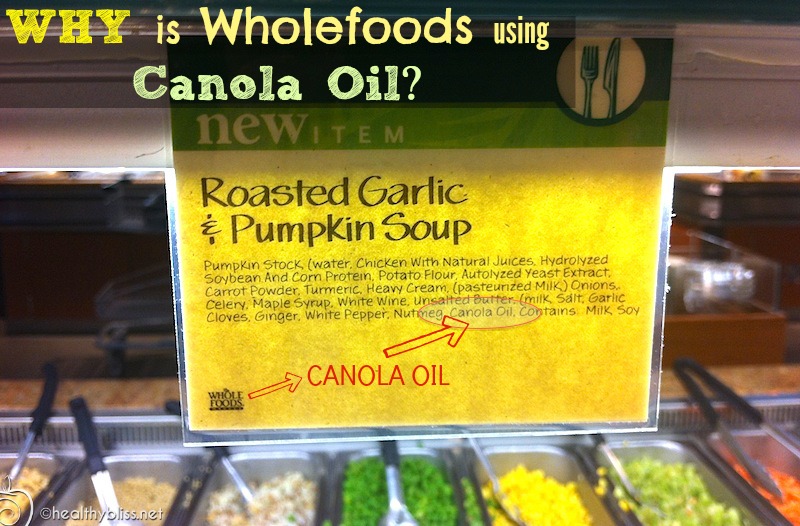
Extra Virgin Olive Oil tastes wonderful in a homemade soup. There is simply no need to use inferior ingredients.
My personal “bad food” radar is usually set for food additives and various forms of hidden Monosodium Glutamate (MSG) found in so-called healthy foods, which I can find in mass abundance on the shelves in every supermarket, including Wholefoods. The food label trickery is simply through the roof. But, you don’t have to be a biologist or scientist to see CANOLA OIL on many labels right there in the ingredients. It’s one you should definitely AVOID. And the worse offender at Wholefoods is in their baked goods and salad bars.
What is Canola Oil and why it’s is Bad for you
You probably never really thought about canola oil and simply thought it was oil from canola, just like olive oil is from olives and sunflower oil is from sunflower seeds. That would make sense in a normal, non-genetically modified world. But, the reality is that there is no canola plant. “Canola” is a made-up word from a GMO plant that has unknown consequences to your health.
Canadian Oil + Low Acid = Canola Oil
Canola oil is made from genetically modified rapeseed plants. The problem was that “rapeseed oil” was so toxic that the FDA banned it for human consumption in 1956. In the 1970’s, Canadian growers bred a new variety of rapeseed with a lower content of the toxic erucic acid, and the name of the new oil was L.E.A.R. (Low Erucic Acid Rapeseed) oil. Eventually, it was renamed “Canola” for marketing reasons, because no company wanted to be associated with a product having “rape” in its name and “rapeseed” oil was well-known to be a toxic oil.
The term Canola was coined from “Canadian oil, low acid” to convince consumers that this “newer and better” rapeseed oil was safe to eat. You see, rapeseed oil was banned from foods, probably because it attacks the heart to cause permanent degenerative lesions. The truth is that rapeseed is the most toxic of all food oil plants. Even insects won’t eat it! That’s right, Canola oil is a very effective insecticide, and it is the primary ingredient in many “organic” (non-chemical) pesticide control products sprayed on vegetables to kill bugs.
The rape seed is part of the mustard family of plants. Mustard gas was made from rapeseeds and used in World War II for genocide.
It is estimated that 93% of the canola oil currently sold in the US has been genetically engineered (GMO). But, since pure non-GMO rapeseed is proven to be toxic and unsafe for human consumption, how can even 7% of canola oil be non-GMO? It seems to be a scientific impossibility, or simply a play on numbers. At best, I’d call it a marketing oxymoron!
Even IF you were eating the 7% “safe” canola oil, is it really safe?
The process of heating canola oil during manufacturing is so extreme that the oil actually becomes rancid and has a terrible smell. The odor is so bad that the manufactures have to deodorize the oil so it doesn’t smell bad! All food grade canola, including the varieties sold in health food stores, are deodorized by 300 degree Fahrenheit high-temperature refining to remove its natural terrible stink.







Symptoms of Intolerance or Allergy to Canola Oil
Rape oil itself has been shown to cause emphysema, respiratory distress, anemia, constipation and blindness in animals and humans. I have personally worked with clients who experienced intense heart palpitations after eating canola oil or products containing canola oil. Once we took the canola oil out of their diet, their symptoms disappeared. Can you imagine if you thought you were having an anxiety attack, only to find out that you were reacting to a frankenfood like canola oil?!
Why on earth would anyone want to eat a GMO rancid oil with deodorants (chemicals) added to it??!! I don’t know about you, but I just lost my appetite for anything except my own homemade Green Smoothie (yum).
Why is Wholefoods using Canola Oil?
This is the million dollar question, or better put…the million dollar profit. Because the only reason why Wholefoods would use a cheap unhealthy ingredient in their over-priced salad bar and baked goods is to maintain a better profit margin. Doesn’t that make you sad? I know it kills me. I want to to believe in a real supermarket that is going to sell me high quality organic ingredients and I am willing to pay more money for it! But, like you, I don’t like being swindled. What’s worse is the pathetic campaign that Wholefoods has started to try and justify the use of what they call “non-GMO Canola oil” in their salad bar. By definition, Canola Oil is GMO…so I cannot understand their faulty logic. Even IF their canola is non-GMO, then it would be pure rapeseed which is a known toxin! Either way, I don’t want it in my food!
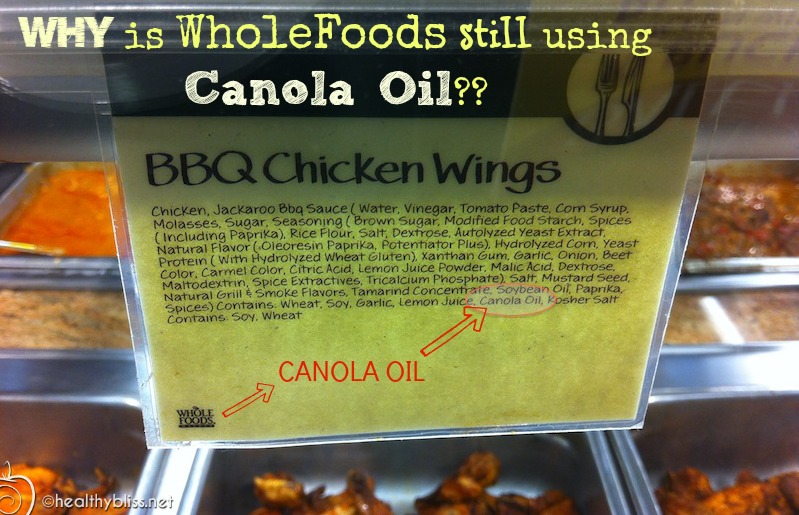
While there are many other “bad” ingredients in this food like yeast extract, the CANOLA OIL is obvious.
Why spend so much time on this issue when you can easily switch to coconut oil or olive oil or pure sunflower oil? There are many vegetable oil options which are heart-healthy, not rancid and made from whole, non-GMO ingredients.
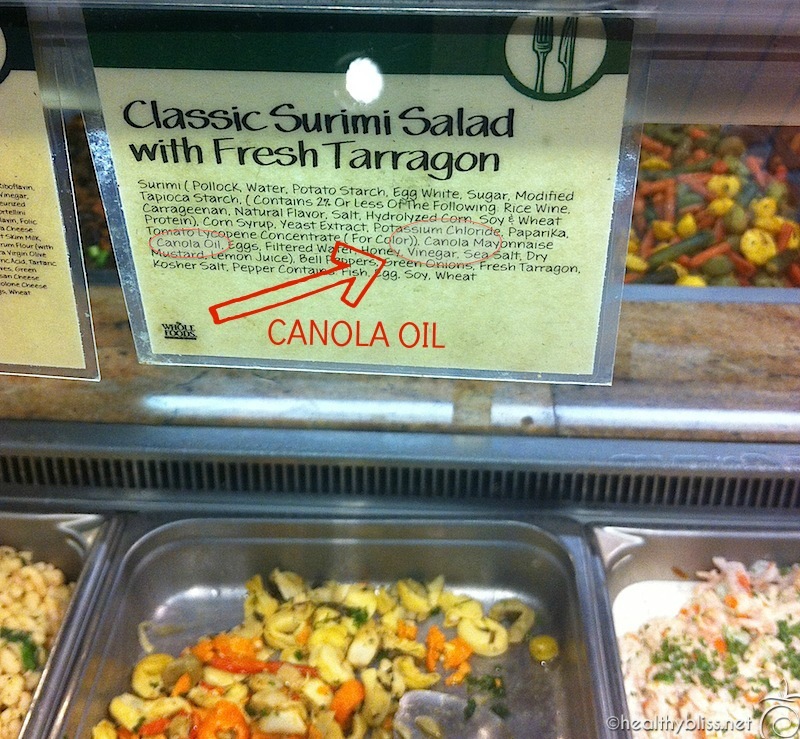
Again, many other ingredients here would stop me like carrageenan and hydrolyzed corn, but the CANOLA OIL is a definite No Thank You!
As a side note, Wholefoods admits to allowing other companies to sell GMO canola oil on their shelves.
Here are some examples:
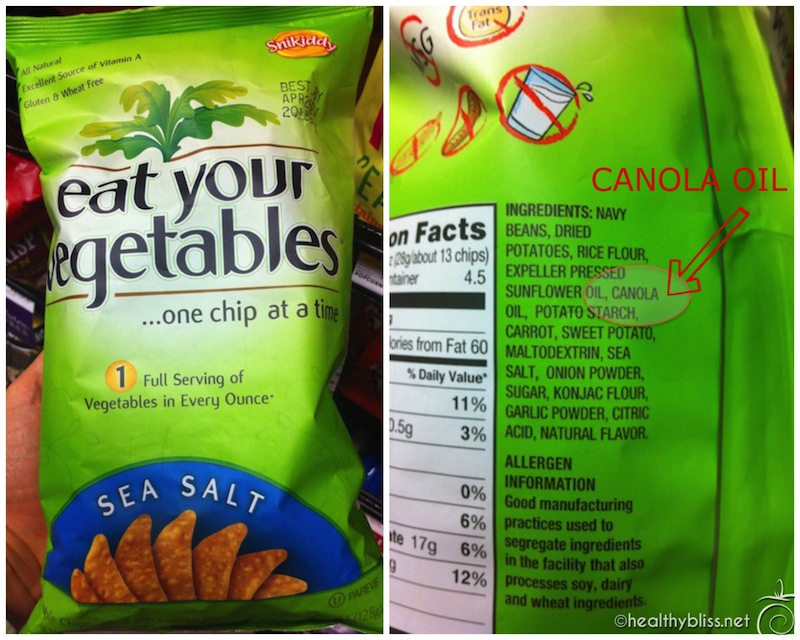
This product is gluten-free and wheat-free and “all natural”…well, except for the GMO Canola Oil
NOTE: This IS Genetically Modified Canola Oil since it is not listed as “organic” or ‘Non-GMO.”
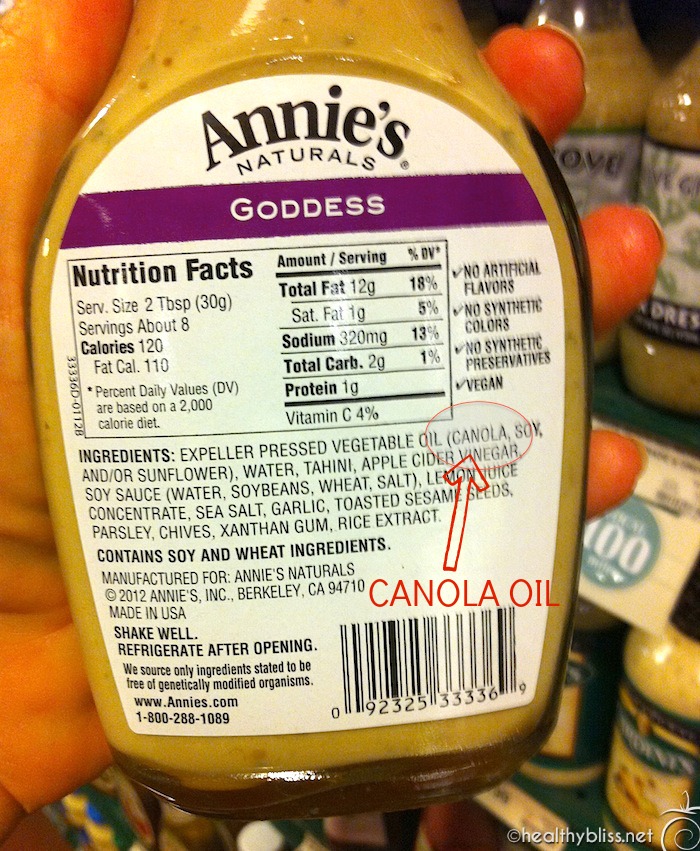
Notice how the label reads “No Synthetic Preservatives” instead of “No Synthetic Ingredients”? Hmmm….
What can you do?
1. Start reading labels. If you see canola oil in a product, baked good or salad bar item, don’t buy it!
2. Share this Information!! The only way to get the word out is to spread the word!!
When companies see sales going down as a result of what we know and don’t want, they will change!
More on GMO:
- What’s Wrong with Vegenaise
- What I Learned from taking a traditional Nutrition Course…and What I Didn’t Learn
- What are Irradiated Foods? What you don’t know CAN hurt you!
- MSG hidden in Packaged Foods: Why I don’t buy 90% of the ‘food’ at WholeFoods
- Genetically Engineered Food – No more Frankenfoods!
More on Whole Foods and Food Additives:
- Sea Salt with Chemical Additives?! Check for E535 & E536 Yellow Prussiate of Soda (YPS)
- The Truth in Food Labeling – Food Additives to Avoid & Hidden Sources of MSG
- Genetically Engineered Food – No more Frankenfoods!
- What’s Wrong with Vegenaise
- Food Containing Ribonucleotides – The Ribo Rash from Food Additives 635, 627 and 631
Jennifer Betesh
Latest posts by Jennifer Betesh (see all)
- What is an elimination diet? - 28 March, 2019
- Intermittent fasting – What’s the best way? - 15 March, 2019
- How do you know when it’s time to STOP fasting - 28 February, 2019
- When is the BEST time (and WORST time) to START a detox - 20 February, 2019

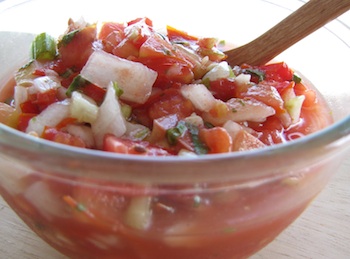


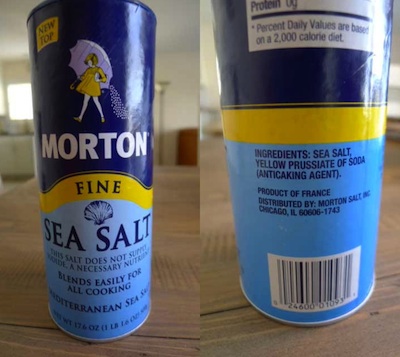






The annoying thing is many of the prepared foods (the salad bar and especially the hot bar) so many of the foods have added oils and many of it is canola oil. You’ll sometimes find it as the second ingredient, so basically it’s just drenched in it.
There ore other better cooking oils you can use (and yes they can cook well). Such as extra virgin olive oil, that should be the oil used. Then maybe hemp oil, avocado oil for a select few dishes.
You are claiming that you use quality ingredients but canola oil is still used in so many of the prepared foods in the salad bar and hot bar (not to mention the few with polysorbate 60 and polysorbate 80). Or how propolyne glycol is not yet listed on the list of unacceptable ingredients in food.
Whole Foods NEEDS to change the fact that they are using canola oil but they probably will not. The best way to avoid it is to avoid anything at the prepared foods and grocery items that have canola oil- or if you want to take it further just do not buy anything from the prepared foods (if it is an issue that you feel strongly about).
It’s absolutely terrible though Whole Foods are not listening to their customers.
As far s that petition though- it’s unfortunately closed.
Hi
On thinking around why this strange oil, i think it’s a GM product used in food production to help the control and maintenence of the processing machines, especially in bread production and processed foods.
Great article, thanks for writing it. This issue is a huge pet peeve for me. Their salad bar is so nice and I think many people enjoy it. However, I read all the ingredients and each time I see Canola Oil, I am so disappointed in them. I think how could they? Don’t’ they know? I will not eat that food. Our bodies do not need any rapeseed plant byproducts. I signed the petition, thanks again for bringing this to light. (I’ve also seen the same issue at New Seasons Market grocery stores in Oregon!) It’s really disgusting that these poisonous oils are in our “health” food.
Hi Laurie,
Thanks for signing the petition and for being so “food aware” already. I’m quite saddened that WF’s is using inferior ingredients, and I would love to see more people speak up! Let’s keep spreading the word!
To your health,
Jennifer
Great post- very informative and helpful! I read the labels on packaged foods in Whole Foods, but never thought they were using GMO oils in their prepared foods! This is an eye opener for me. Thanks.
Thanks for the info. I have been using Canola oil to make my own homemade mayo for years. I definitely will stop using it. Can you tell me what oil can I use? How about Grape-seeds oil?
Happy to hear from you.
Tsipy
Hi Tsipy!
You’ve raised a great question, and that is…what to use instead?
Some people would say that Grapeseed oil is ok, but there are usually a lot of solvents used to make it and the oil itself is high in polyunsaturated fats.
For baking, I would suggest to take the recipe’s recommended oil and 1/2 it with organic apple sauce. For the remaining half, you could use organic coconut oil (if it’s a sweet recipe) and a blend of organic olive oil or sunflower oil for a savory recipe.
In your case for homemade mayo, have you tried olive oil? You might have to use less to get the correct consistency that you like.
By the way, some readers may want to know your recipe for the vegan mayo so feel free to share!
To your health,
Jennifer